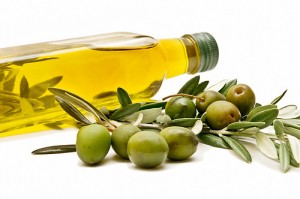Olive Oil- the better fat for your heart
Diets that include olive oil
Most olives are grown in countries that surround the Mediterranean Sea. Many people who live in this area have reduced rates of death from coronary heart disease and certain cancers. Research studies show that when people in other parts of the world eat a diet that includes olive oil similar to those in the Mediterranean countries, they reduce their risk of heart disease. Some still steer clear of olive oil. Don’t look the other way at the grocery store when passing this great oil. Do not think “I can’t buy it- its full of fat”. Do we need to choose our fats wisely? Yes! Realize there are different kinds of fats. Some kinds of fats raise cholesterol and raise your chances of heart disease. Other types of fats are good for your body in moderation.
Types of fats and where they come from
Did you know that your body makes its own fat? This happens when you take in too many calories. There are also fats found in food that come from plants and animals and is called dietary fat. Your body requires fats for different body functions.
Damaging Fats
There are two types of damaging fats. Trans fat and saturated fats.
- Trans fats are unsaturated fats which are uncommon in nature. They can be created artificially. The United States FDA has issued a preliminary determination stating that partially hydrogenated oils (which contain trans fats) are not “generally recognized as safe”, which is expected to lead to banning industrially produced trans fats from the American diet. There are research studies that do show that trans fats can increase unhealthy LDL cholesterol and lower healthy HDL ( high density lipoprotein) cholesterol. Thus, your risk of using trans fats can increase your risk of cardiovascular disease. Foods that have trans fats in them are: pies, crusts for pies, margarine sticks, shortening, cake mixes and frostings, ice cream, ground beef, meat sticks, most crackers, etc.
- Saturated fats simply means the fat molecule is fully saturated with hydrogen atoms, so that there are no double bonds between the carbon atoms. Saturated fats are typically solid at room temperature. Examples of foods that have saturated fats in them: lard, cream, butter, cheese, poultry with skin on it, etc.
Healthier dietary fat choices
There are three types of fats that are healthier choices.
- Monounsaturated fats have one single carbon bond, which differentiates them from polyunsaturated fats which contain multiple double carbon bonds. Studies are showing that monounsaturated fats reduce bad cholesterol in the blood. These types of fats help in aiding in weight loss. Some examples of food that contain this type of fat are: olive oil, avocados, grape seed oil, almond butter, olives and most nuts.
- Omega 3 fatty acids are unsaturated fatty acids. Studies have shown that Omega 3 fatty acids have anti-inflammatory properties. They are helpful in reducing pain in people with arthritis. can also reduce the risk of heart disease, diabetes and blood clotting disorders. Examples of where you can find these acids are in fish such as salmon, flax seed oil, walnuts, pine nuts, etc.
- Omega 6 fatty acids are polyunsaturated fats that your body can not produce naturally. You have to get this type of fat by dietary sources. These types of fats are important for growth and brain development. For those looking to regulate metabolism keep track of your Omega 6 fatty acid intake. An important note for elderly adults and growing children is that Omega 6 acids are important for bone health. Skin and hair growth also are effected by this acid. It is important to note that consuming too much of this Omega 6 fat can cause inflammation. You should try to balance out how much of the Omega 6 and Omega 3 fatty acids you consume. Oils such as sunflower, grapeseed, wheat germ, walnut, soybean are good sources of this fat. Other sources of this fat are contained in sunflower seed kernels, butternuts, pine nuts, some ranch sauces, turkey, chicken, peanuts, etc. Click here for a more in depth list of foods highest in Omega 6 fatty acids.
Olive oil- the better fat for your heart
When choosing from butter, olive oil or margarine choose olive oil- the better fat for your heart. Olive oil contains compounds that are called antioxidants. These antioxidants disable free radicals in the body before they can do damage to your arteries. Getting more olive oil in your diet can help to keep a persons’ arteries clear. Now please do not misinterperut what I said. Please do not rush out and buy a bottle of olive oil and guzzle away. Studies have shown that just 2 tablespoons of olive oil every day is sufficent.
Types of olive oil
Light, pure or virgin or extra virgin? Which one you choose to purchase depends on your purpose. Light olive oil is most used by people who want the heart-healthy benefits of monounsaturated facts. Virgin or pure olive oil is primarily used for frying over low to medium heat. Extra virgin is mostly used as a flavoring for foods and is not suggested to use for cooking.
Best Storing Practices
As mentioned earlier olive oil has a high amount monounsaturated fat. What does that mean for you? You can store it longer that most oils. You can store it longer under the right conditions. The right conditions include what you keep it in and what temperature stored at. Storing it in a wine cellar at 57 degrees Farhenheit would be perfect. Seeing how that most likely not very realistic, try to store it at room temperature (@ 70 degrees Fahrenheit), if that’s not possible keep it in the fridge. Storing it in the fridge does have its drawbacks. It will have to sit out to return to its fluidity. Try to use either stainless steel or tinted glass containers for maximum quality.
Recipe
One of my favorite ways to enjoy olive oil is by making a bread dipping oil. The possibilities of spice flavorings are endless. If you enjoy cooking give the following recipe a try courtesy of allrecipes.com. There are pre made spices too that are available at most grocery stores. I highly recommend Wegmans’ fresh cut organic multi grain baguette bread for dipping.
*Remember you are never too young or too old to take care of your heart. Here at Loving Hearts Home Care our direct care staff can provide meal preparation and much more for you or your loved one. Please remember using olive oil in your diet may not appear to make overnight changes in your health but, if you make healthy choices even adding one heart healthy choice into your diet and exercise routine you are benefiting your body in positive ways.
Sources:
Mayoclinic.com, FitDay.com, RecipesHowStuffWorks.com, HowStuffWorks.com, Allrecipes.com
The Doctors Book of Food Remedies









Comments